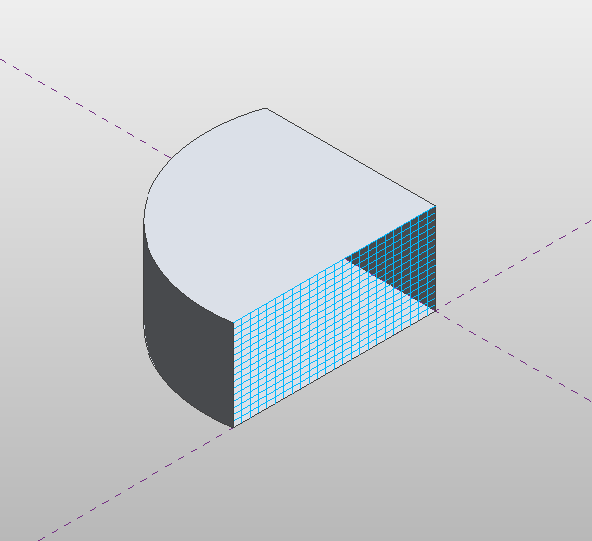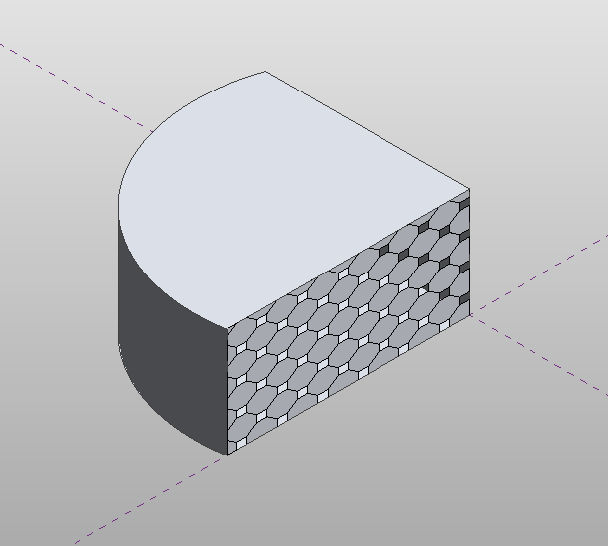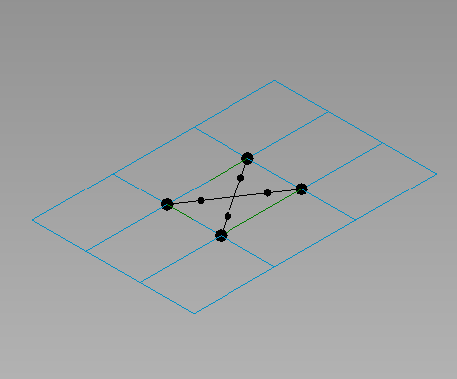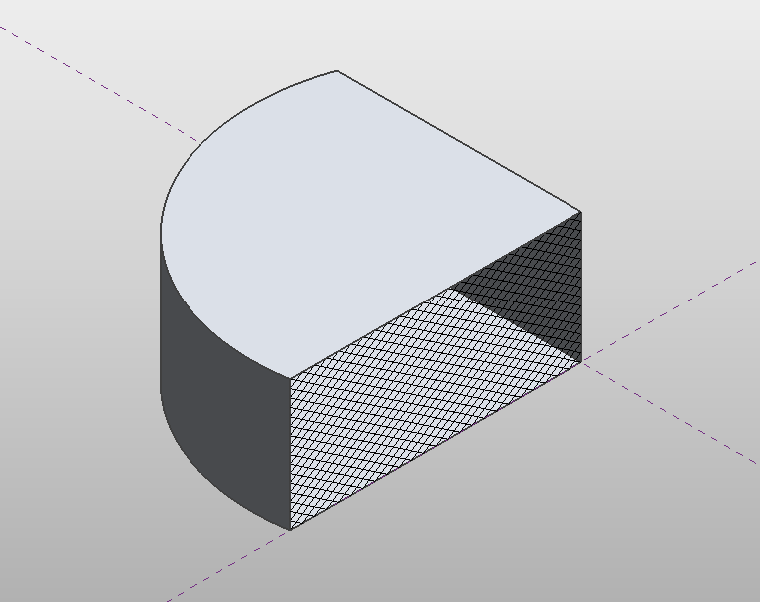サーフェスを活用する
サーフェスを分割する
UV グリッドを使用してフォームの面を分割することができます。(次の例で示す) DividedSurface.GetReferencesWithDividedSurface()メソッドと DividedSurface.GetDividedSurfaceForReference()メソッドを使用して、分割サーフェスのデータにアクセスしたり、下記のようにフォームの新しく分割サーフェスを作成できます。
|
コード領域 14-7: サーフェスを分割 |
public void DivideSurface(Document document, Form form)
{
Autodesk.Revit.ApplicationServices.Application application = document.Application;
Options opt = application.Create.NewGeometryOptions();
opt.ComputeReferences = true;
Autodesk.Revit.DB.GeometryElement geomElem = form.get_Geometry(opt);
foreach (GeometryObject geomObj in geomElem)
{
Solid solid = geomObj as Solid;
foreach (Face face in solid.Faces)
{
if (face.Reference != null)
{
DividedSurface ds = DividedSurface.Create(document,face.Reference);
// create a divided surface with fixed number of U and V grid lines
SpacingRule srU = ds.USpacingRule;
srU.SetLayoutFixedNumber(16, SpacingRuleJustification.Center, 0, 0);
SpacingRule srV = ds.VSpacingRule;
srV.SetLayoutFixedNumber(24, SpacingRuleJustification.Center, 0, 0);
break; // just divide one face of form
}
}
}
}
|

図 60: UV グリッドで分割されたフォームの面
DividedSurface の USpacing および VSpacing プロパティにアクセスすると、グリッドの固定数(上の例を参照)、グリッド間の固定距離、グリッド間の最小または最大間隔のいずれかを指定して、U および V グリッドラインの SpacingRule を定義できます。位置合わせおよびグリッドの回転などの各間隔規則には、追加情報が必要です。
サーフェスをパターン化する
分割されたサーフェスはパターン化することができます。任意の組み込みのタイル パターンを分割サーフェスに適用することができます。タイル パターンは、DividedSurface に割り当てられている ElementType です。タイル パターンは UV グリッド レイアウトに従ってサーフェスに適用されるため、DividedSurface の USpacing および VSpacing プロパティを変更すると、パターン化されたサーフェスの表示方法に影響を与えます。
次の例は、OctagonRotate パターンを使用して分割サーフェスをカバーする方法を示しています。これに対応する図は、前の例の分割サーフェスに適用されたときにどのように見えるかを示します。注 この例では、フォームで DividedSurface を取得する方法も示します。
|
コードの領域 14-8: サーフェスをパターン化 |
public void TileSurface(Document document, Form form)
{
// cover surface with OctagonRotate tile pattern
TilePatterns tilePatterns = document.Settings.TilePatterns;
foreach (Reference r in DividedSurface.GetReferencesWithDividedSurfaces(form))
{
DividedSurface ds = DividedSurface.GetDividedSurfaceForReference(document, r);
ds.ChangeTypeId(tilePatterns.GetTilePattern(TilePatternsBuiltIn.OctagonRotate).Id);
}
}
|

図 61: 分割サーフェスに適用されたタイル パターン
分割サーフェスに組み込みタイル パターンを適用するのに加えて、「Curtain Panel Pattern Based.rft」テンプレートを使用して、独自のマス パネル ファミリを作成できます。これらのパネル ファミリは、マス ファミリにロードしたり、DividedSurface.ChangeTypeId()メソッドを使用して分割サーフェスに適用できます。
Family の以下のプロパティが、カーテン パネル ファミリに固有のものです。
- IsCurtainPanelFamily
- CurtainPanelHorizontalSpacing - メッシュ処理の水平間隔
- CurtainPanelVerticalSpacing - メッシュ処理の垂直間隔
- CurtainPanelTilePattern - タイル パターンの選択
次の例では、コンセプト マス ドキュメントのフォームに適用できるマス パネル ファミリを編集する方法を示しています。この例を実行するには、まず「Curtain Panel Pattern Based.rft」テンプレートを使用して、新しいファミリ ドキュメントを作成します。
|
コード領域 14-9: カーテン パネル ファミリを編集 |
Family family = document.OwnerFamily;
if (family.IsCurtainPanelFamily == true &&
family.CurtainPanelTilePattern == TilePatternsBuiltIn.Rectangle)
{
// first change spacing of grids in family document
family.CurtainPanelHorizontalSpacing = 20;
family.CurtainPanelVerticalSpacing = 30;
// create new points and lines on grid
Autodesk.Revit.ApplicationServices.Application app = document.Application;
FilteredElementCollector collector = new FilteredElementCollector(document);
ICollection<Element> collection = collector.OfClass(typeof(ReferencePoint)).ToElements();
int ctr = 0;
ReferencePoint rp0 = null, rp1 = null, rp2 = null, rp3 = null;
foreach (Autodesk.Revit.DB.Element e in collection)
{
ReferencePoint rp = e as ReferencePoint;
switch (ctr)
{
case 0:
rp0 = rp;
break;
case 1:
rp1 = rp;
break;
case 2:
rp2 = rp;
break;
case 3:
rp3 = rp;
break;
}
ctr++;
}
ReferencePointArray rpAr = new ReferencePointArray();
rpAr.Append(rp0);
rpAr.Append(rp2);
CurveByPoints curve1 = document.FamilyCreate.NewCurveByPoints(rpAr);
PointLocationOnCurve pointLocationOnCurve25 = new PointLocationOnCurve(PointOnCurveMeasurementType.NormalizedCurveParameter, 0.25, PointOnCurveMeasureFrom.Beginning);
PointOnEdge poeA = app.Create.NewPointOnEdge(curve1.GeometryCurve.Reference, pointLocationOnCurve25);
ReferencePoint rpA = document.FamilyCreate.NewReferencePoint(poeA);
PointLocationOnCurve pointLocationOnCurve75 = new PointLocationOnCurve(PointOnCurveMeasurementType.NormalizedCurveParameter, 0.75, PointOnCurveMeasureFrom.Beginning);
PointOnEdge poeB = app.Create.NewPointOnEdge(curve1.GeometryCurve.Reference, pointLocationOnCurve75);
ReferencePoint rpB = document.FamilyCreate.NewReferencePoint(poeB);
rpAr.Clear();
rpAr.Append(rp1);
rpAr.Append(rp3);
CurveByPoints curve2 = document.FamilyCreate.NewCurveByPoints(rpAr);
PointOnEdge poeC = app.Create.NewPointOnEdge(curve2.GeometryCurve.Reference, pointLocationOnCurve25);
ReferencePoint rpC = document.FamilyCreate.NewReferencePoint(poeC);
PointOnEdge poeD = app.Create.NewPointOnEdge(curve2.GeometryCurve.Reference, pointLocationOnCurve75);
ReferencePoint rpD = document.FamilyCreate.NewReferencePoint(poeD);
}
else
{
throw new Exception("Please open a curtain family document before calling this command.");
}
|

図 62: カーテン パネル ファミリ

図 63: 分割サーフェスに割り当てられたカーテン パネル